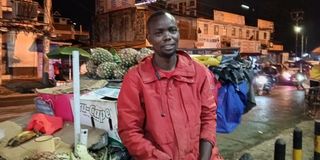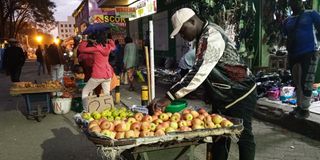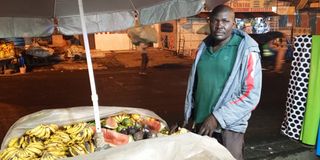Biz Lounge: Selling fruits in Nakuru enabled us to build our homes

John Maina sells pineapples in Nakuru city on October 5, 2024.
For the past three years, John Maina has been running a fruit vending business, a trade often seen as one for a select few or for those in desperate circumstances.
After losing his teaching job during the COVID-19 pandemic, Maina turned to selling fruits. His decision attracted both support and criticism, with some people perceiving fruit vending as a job primarily suited for women.
"My decision to venture into fruit vending came from necessity. As an unemployed graduate, I worked as a teacher in a private school, but I lost my job when the pandemic hit. I spent a year hawking fruits before I could afford a cart to operate from one place," Maina explains.
He specializes in selling pineapples, investing between Sh. 3,000 and Sh. 5,000 in stock, two to three times a week. From this, he earns an average profit of Sh. 2,000 per day.
However, Maina faces challenges, such as occasionally receiving bitter pineapples, which could turn customers away for good.
Rainy seasons pose another difficulty. "During the rain, it’s hard because we’re exposed, and customers don’t like to take pineapples in cold days. Sometimes, I buy large quantities of stock, but if the weather is cold, I’m stuck with them longer than expected," Maina says.
Such situations can lead to financial losses, pushing him to seek loans from shylocks to keep his business afloat
Despite the challenges, Maina has managed to purchase land and build a house from his business profits. He now hopes to transition into farming in the future.
Similarly, Joseph Nyongesa, nicknamed "Apple Man," sells apples near Wakulima Market. He buys 20 boxes of apples from Nairobi and sells Sh. 35 per apple, earning between Sh. 700 and Sh. 1,200 per box.

Joseph Nyongesa sells apples near Wakulima market in Nakuru on October 5, 2024.
One of his challenges is combating the misconception that his apples are rejects, which he denies.
"People think my apples are rejects from the market, but that’s not true. I source them directly from Nairobi," Nyongesa says.
He also struggles with local enforcement officers, who sometimes prevent him from selling on the streets, leaving him with unsold stock at the end of the day.
Nyongesa’s business has allowed him to build a house, purchase land, and open a clothing shop.
He proudly notes that the fruit business has granted him financial independence.
For Kodek Ombui, fruit vending has been his livelihood for 17 years. He stresses that it's a tricky business requiring careful balance to avoid losses.

Kodek Ombui, a fruit vendor for 17 years in Nakuru city during an interview on October 5, 2024.
"It’s crucial to understand your customers’ needs because the fruits we sell are very perishable," he explains.
Ombui shares that his fruit vending business has been able to support his family, including providing education for his children.
Like others, he faces challenges, particularly from inconsistent weather and enforcement officers confiscating his goods.
"Buying fruits in the market can be difficult, especially if you don’t have a specific supplier or when you need to cater to a customer but lack the required fruit," Ombui adds.
